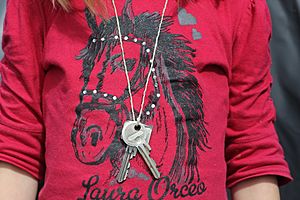Latchkey kid facts for kids
A latchkey kid is a child who goes home after school to an empty house. This happens because their parents are usually at work. The child often has a key to let themselves in. This term helps us understand how some kids learn to be independent from a young age.
Contents
History of Latchkey Kids
The idea of "latchkey kids" first became common during World War II. Many men were away fighting in the armed forces. At the same time, many women started working in factories or on farms to support the war effort. This meant that when children came home from school, their parents were often not there.
After the war, things changed for a while. But in the 1960s and later, more and more mothers began to work outside the home regularly. Because of this, having latchkey children became common again. Libraries sometimes found that many kids would come to spend a few hours there after school.
What It Means for Kids
Being a latchkey kid can have different effects on children. Some kids learn to be very responsible and independent. They might learn to do chores, prepare snacks, and manage their time well. They also learn to solve problems on their own.
However, it can also be a bit challenging. Some children might feel lonely or bored. They might miss having an adult around right after school. It is important for these children to feel safe and supported.
Developing Independence
Many latchkey kids develop strong independence skills. They learn to take care of themselves. This can include making their own decisions about homework or playtime. They also learn to follow rules set by their parents. This helps them grow into capable young adults.
Staying Safe at Home
Parents of latchkey kids often set up clear rules for safety. These rules might include not opening the door to strangers. They also learn how to handle emergencies. Knowing what to do helps children feel more secure when they are home alone.
Connecting with Others
Even though they are home alone, many latchkey kids still connect with others. They might talk to friends on the phone or play outside with neighbors. Some join after-school clubs or activities. This helps them stay social and active.
Related pages
- Helicopter parent
- Free-range parenting
See also
 In Spanish: Niño de la llave para niños
In Spanish: Niño de la llave para niños
 | Lonnie Johnson |
 | Granville Woods |
 | Lewis Howard Latimer |
 | James West |


